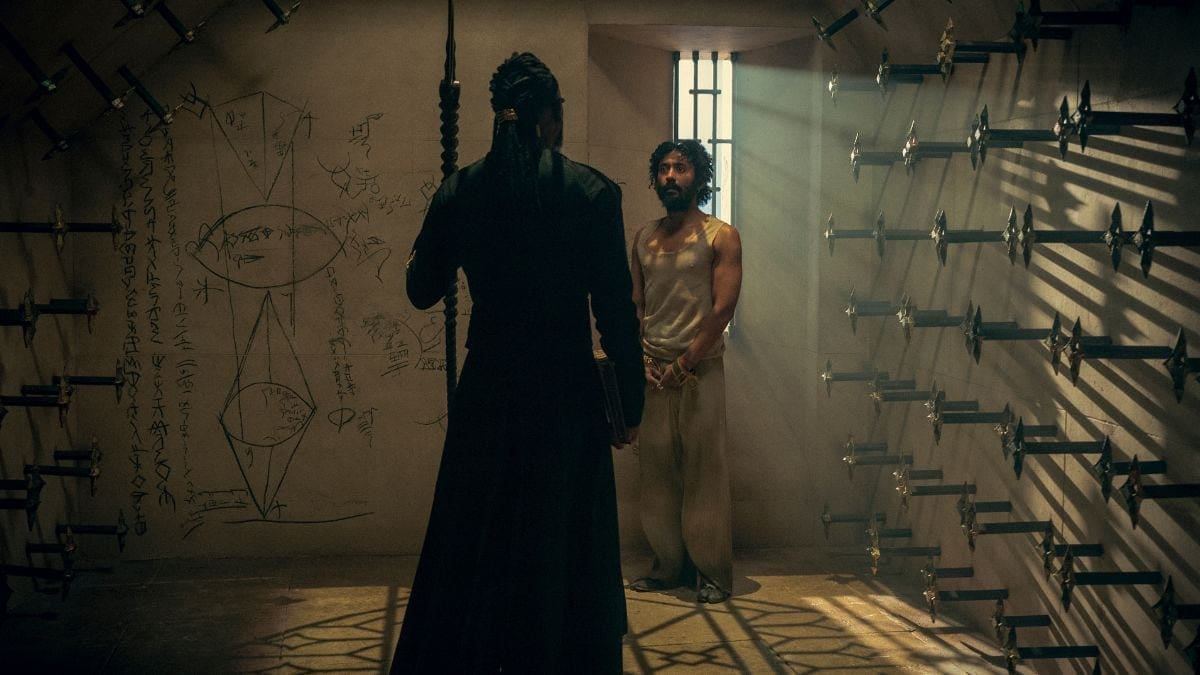Expanding the lore of the previous Henry Cavill starrer Netflix series, The Witcher Blood Origin, the prequel set 1200 years before Geralt of Rivia made his name on the map, dropped on the digital streaming platform on December 25, 2022 with four episodes. While the first episode stands as the longest one with the runtime of 63 minutes, the last works out the shortest runtime of all with 42 minutes.
The series brings on the leading cast starring Sophia Brown as Éile or the Lark, Michelle Yeoh as Scian, Laurence O’Fuarain as Fjall, Huw Novelli as Callan, Francesca Mills as Meldof, Amy Murray as Fenrik, Zach Wyatt as Syndril, Lenny Henry as Chief Druid Balor, Mirren Mack as Merwyn, Nathaniel Curtis as Brían, Jacob Collins-Levy as Eredin and more. Created by Declan De Barra and Lauren Schmidt Hissrich, the limited fantasy drama is based on Andrzej Sapkowski’s novel series.
Netflix’s official description of the series reads:
In a story lost to time, heralding the origins of the witcherverse, a band of warriors joins forces on a quest of vengeance, redemption and sacrifice.
-The Witcher Blood Origin Review Does Not Contain Spoilers-
Introducing the coming together of seven outcasts reigning from different clans, the series largely puts focus on just three of them – Eile (Brown) of the Raven Clan, Fjall (O’Fuarain) of the Dog Clan and Scian (Yeoh) the last standing member of the Ghost tribe. One’s eyes may light up on the sight of Yeoh’s character initially, who brings about severe twists and turns owing to her personal agenda fuelled by the purpose for her tribe. Brown’s Eile is a force to reckon with as well and walks in as the badass warrior (turned bard) dropping bodies in agile action-packed sequences.
However, their characters are more than meets the eye. Unfortunately, none of that is translated on to the screen in the limited and constraining timeframe of four episodes. The compact presentation of the ‘mini’ series takes the term too seriously and drags in the plot device of a narrator to clean up the mess. From the get go, this acts as a two-edged sword. The approach works well in terms of putting out a different chapter without taking our focus away from Geralt, because his absence clearly weighs down on the image of Blood Origin (as was already expected of it), but we also don’t have to spend endless hours on the prequel and finish watching it quickly.

The more evident negative impact that hollows out the show is that the short duration relies on the the voiceover of the narrator looming heavy on the plot as a means to thread the story instead of letting its characters do the talking. Archetypal elements of the fantasy genre like blood pacts and corny grandiose dialogues try to leave an impact on us, but fail miserably as they walk out through the other end of the cave as clumsy outputs.
Also read: Alchemy of Souls Season 2 Episode 6 Preview: When, Where and How to Watch!
Deliveries like the signature “To the end”, which also finds room in the trailer, and “Come with me if you want to live” in addition to others are ineptly handled and are loaded with the cringe factor. Thus, trying too hard to make it all seem worthy and magnificent, the show never really comes across as a unique stand-out.
When it comes to who the antagonist is, you’ll keep asking the same question repeatedly and will still be turned away without a fruitful answer. No one stands tall as a worthy opponent, which further pushes the series to its fall with no clear purpose and agenda in mind. On the other hand, a great deal is made out of Yeoh’s character, but she’s never fully fledged out, again due to the time constraint.
With a long list of fantastical and adventure-based sagas already rising high on other streaming platforms like HBO Max and Prime Video as well, the roots of the various lores can easily intertwine in the end. Therefore, in such a scenario, it all comes down to the characters to make the most of it and leave a mark on us. Blood Origin, though, barely delves much into the expansive tribe of seemingly interesting character, and keeps filling the space with action scenes that eventually start slipping into the forgettable territory despite their initial lustrous appeal.

The Witcher Blood Origin: Final Thoughts
Michelle Yeoh’s significance remains under utilised. It seems that her arrival as one of the paramount presences is only brought on to make amends for the lack of another original and titular role. The prequel is constructed as an old tale, one found in the books and requiring a storyteller. Thus, ultimately putting the focus on the narration, it loses the grip over the audience with underdeveloped characters.
The outlook of the series tries its all to make something big and mind-bending happen, but it never actually catches a chance to accomplish the task. Moreover, as soon as things start warming up between the lead characters, and the obvious star-crossed pair, it all comes to an abrupt end.
Call it fortunate or unfortunate (overtly the latter for this four-part show), Geralt occupies such a hefty space in The Witcher lore and his glory remains unmatched. Therefore, as viewers, we have to take a conscious step outside, even if it feels impossible, to look at these characters on their own in whatever limited room they take up, but even then no one emerges with a heartrending portrayal.
With a post credits scene that relates to the original series, and some developments throughout the episodes hinting at what’s to come next in the forthcoming third instalment of the Witcherverse, the recent release surfaces as a mere stepping stone filling in the time before Geralt’s return.
The Witcher: Blood Origin is now streaming on Netflix.
Also read: Roald Dahl’s Matilda the Musical Review: Fun-Filled Childhood Rebellion


